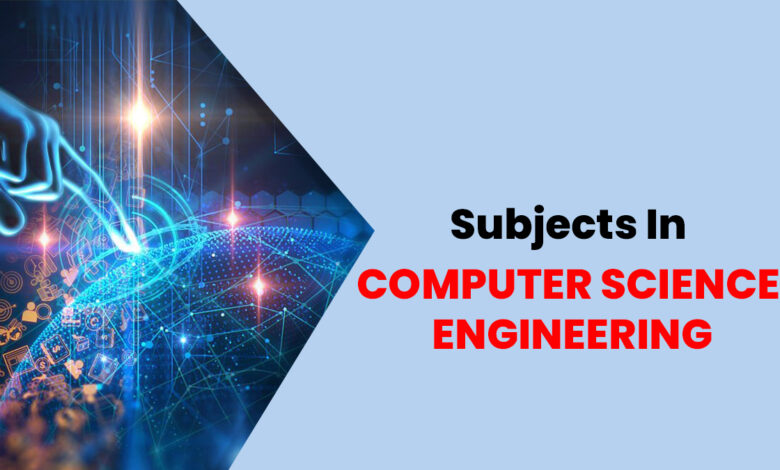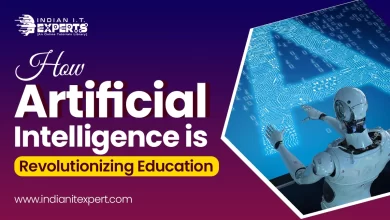Subjects in Computer Science Engineering | Computer Science Engineering Syllabus and Subjects

Computer Science Engineering (CSE) is a training program that combines computer building and computer science. This course covers a wide range of topics but focuses on computer programming and networking fundamentals. The topics covered during the period include computation, calculations, programming dialects, program design, computer programs, computer equipment, and so on.
Computer science engineers work in a variety of computing fields, from individual computers and supercomputers to circuit design and the creation of computer programs that power them. In India and abroad, highly specialized organizations provide UG (Undergraduate) and PG (Postgraduate) level courses in Computer Science engineering. In this blog we will learn in detail about subjects in Computer Science Engineering.
Table of Contents
Subjects in Computer Science Engineering (B.E., B. Tech, etc.):
After the 12th grade, one of the most popular courses is computer science engineering. It teaches you everything you need to know about computer systems, including hardware and software.
Some of the essential B Tech subjects covered in this course include:
1. Operating Systems:
An operating system (OS) is a program that manages all of the other application programs in a computer after being loaded into the computer by a boot program. The operating system communicates with application programs by requesting services via a predefined application programming interface (API).
2. Computer Networks:
A computer network is a collection of computers that share resources that are located on or provided by network nodes. To communicate with one another, computers use common communication protocols over digital interconnections. These interconnections are made up of telecommunication network technologies based on physically wired, optical, and wireless radio-frequency methods, and they can be configured in a variety of network topologies. A computer network can include nodes such as personal computers, servers, networking hardware, and other specialized or general-purpose hosts.
3. Artificial Intelligence:
The simulation of human intelligence processes by machines, particularly computer systems, is known as artificial intelligence. Expert systems, natural language processing, speech recognition, and machine vision are some of the examples of AI applications.
4. Computer Architecture:
Computer architecture is the organization of the components that comprise a computer system, as well as the meaning of the operations that govern its operation. It specifies what is visible on the machine interface, which is the target of programming languages and compilers.
Also Check:
- SBOTOP: Situs Judi Bola dengan Pembayaran Kemenangan yang Tidak Pernah Tertunda
- How to Get a Job in Digital Marketing?
- Career in Natural Language Processing
- Career in Algorithm
- Career AI Researchers
5. Data Structure and Algorithms:
A data structure is a named location where data can be stored and organized. And an algorithm is a set of steps used to solve a specific problem. Data Structures and Algorithms helps us to write efficient and optimized computer programs.
6. Machine Learning:
Machine learning (ML) is a subset of artificial intelligence (AI) that enables software applications to become more accurate at predicting outcomes without explicitly programming them to do so.
7. Computer Forensics:
Computer forensics is the use of investigative techniques to identify and store evidence from a computer device. Computer forensics is frequently used to uncover evidence that could be used in court. Computer forensics also includes areas other than investigations.
8. Programming in C, C++:
The C programming language is a machine-independent programming language that is primarily used to create various applications and operating systems such as Windows, as well as more complex programs such as the Oracle database, Git, the Python interpreter, and games. C++ is an extremely capable general-purpose programming language.
It is capable of producing operating systems, browsers, and games, among other things. C++ supports a wide range of programming styles, including procedural, object-oriented, and functional programming. As a result, C++ is both powerful and flexible.
9. Programming in Java:
Java is an extremely capable general-purpose programming language. It is used to create desktop and mobile applications, as well as big data processing and embedded systems. Oracle, the company that owns Java, claims that Java is used on 3 billion devices worldwide, making it one of the most popular programming languages.
10. Programming in Python:
Python is a computer programming language that is frequently used to create websites and software, automate tasks, and analyze data. Python is a general-purpose programming language, which means it can be used to create a wide variety of programs and is not focused on a specific problem.
Subjects in Computer Science Engineering (M.E., M. Tech, etc.):
1. Artificial Intelligence:
Artificial intelligence (AI) refers to intelligence demonstrated by machines as opposed to natural intelligence demonstrated by animals such as humans. AI research has been defined as the study of intelligent agents, which refers to any system that perceives its environment and takes actions that increase its chances of success.
2. Cloud Computing:
Cloud computing refers to the on-demand availability of computer system resources, particularly data storage (cloud storage) and computing power, without the user’s direct active management. Cloud computing is based on resource sharing to achieve coherence and typically employs a “pay-as-you-go” model, which can help reduce capital expenses but can also result in unexpected operating expenses for uninformed users.
3. DevOps:
DevOps is a set of cultural philosophies, practices, and tools that improves an organization’s ability to deliver applications and services at high velocity.
4. Design and Analysis of Algorithms:
An algorithm is a set of steps that are used to solve a problem. Algorithm design and analysis are critical for designing algorithms to solve various types of problems in the field of computer science and information technology.
5. Computer Organization and Architecture:
The study of the internal workings, structuring, and implementation of a computer system is known as computer organization and architecture. Architecture in a computer system, like architecture anywhere else, refers to the system’s externally visible attributes.
6. Discrete Mathematics:
The study of mathematical structures that are countable or otherwise distinct and separable is known as discrete mathematics. Discrete structures include combinations, graphs, and logical statements. Finite or infinite discrete structures exist.
7. Database Management Systems:
A database management system (DBMS) is a software tool that is used to create and manage one or more databases. It provides an easy way to create a database, update tables, retrieve information, and enhance data. A database management system (DBMS) is where data is accessed, modified, and locked to prevent conflicts.
8. Software Engineering:
The field of computer science that deals with the design, development, testing, and maintenance of software applications is known as software engineering.
9. Theory of Computation:
Theory of computation (TOC) is a branch of computer science concerned with how and how efficiently problems can be solved using algorithms. Real-world computers solve problems in systematic ways by performing computations that, by definition, run like mathematical models.
10. Multi-device programming:
The programming that can be done on various devices is referred to as Multi-device programming.
11. Advanced Java Programming:
It is included in the Java programming language. It is a sophisticated technology or version of Java that is specifically designed to create web-based, network-centric, or enterprise applications. It includes concepts like Servlet, JSP, JDBC, RMI, and socket programming. It is a specialization in a particular field.
Conclusion
In the above article, we have learned in detail about various subjects in Computer Science Engineering. With every business and organization going digital, the information technology sector is now a thriving field in comparison to other sectors, with a high demand for Computer Science Engineers and programmers.
FAQs regarding subjects in Computer Science Engineering:
-
How many different subjects are there in computer science engineering?
Operating systems, algorithm design and analysis, programming languages, microprocessors, computer software, database management systems, mobile communications, cryptography, network security, performance evaluation, and other major topics are covered in any CSE undergraduate degree course.
-
Does CSE include math?
Certain mathematical subjects, such as calculus, probability, statistics, linear algebra, linear programming, and so on, are inextricably linked to computer science and computer programming.
-
Is CS engineering simple?
Computer Science and Computer Engineering are both difficult degrees to obtain. They cover different areas of Mathematics (logical proofs and data structures for CS, calculus for CE) and aren’t a good fit for students who want to relax and enjoy college life.
-
Is CSE math difficult?
While Computer Science requires less math than a pure mathematics degree or even an electrical engineering degree, some of the math you will encounter will be more difficult and theoretical than you might expect. It is also possible that your university has different computer science requirements.
-
What are the subjects in Computer Science Engineering 1st semester?
The first semester CSE syllabus is as follows:
1. Applied Mathematics -1.
2. Applied Physics – 1.
3. Applied Chemistry -1.
4. Manufacturing Process.
5. Introduction to Computers and Auto CAD.
6. Communication Skills – 1.
7. Impact of Science & Technology on Society.




